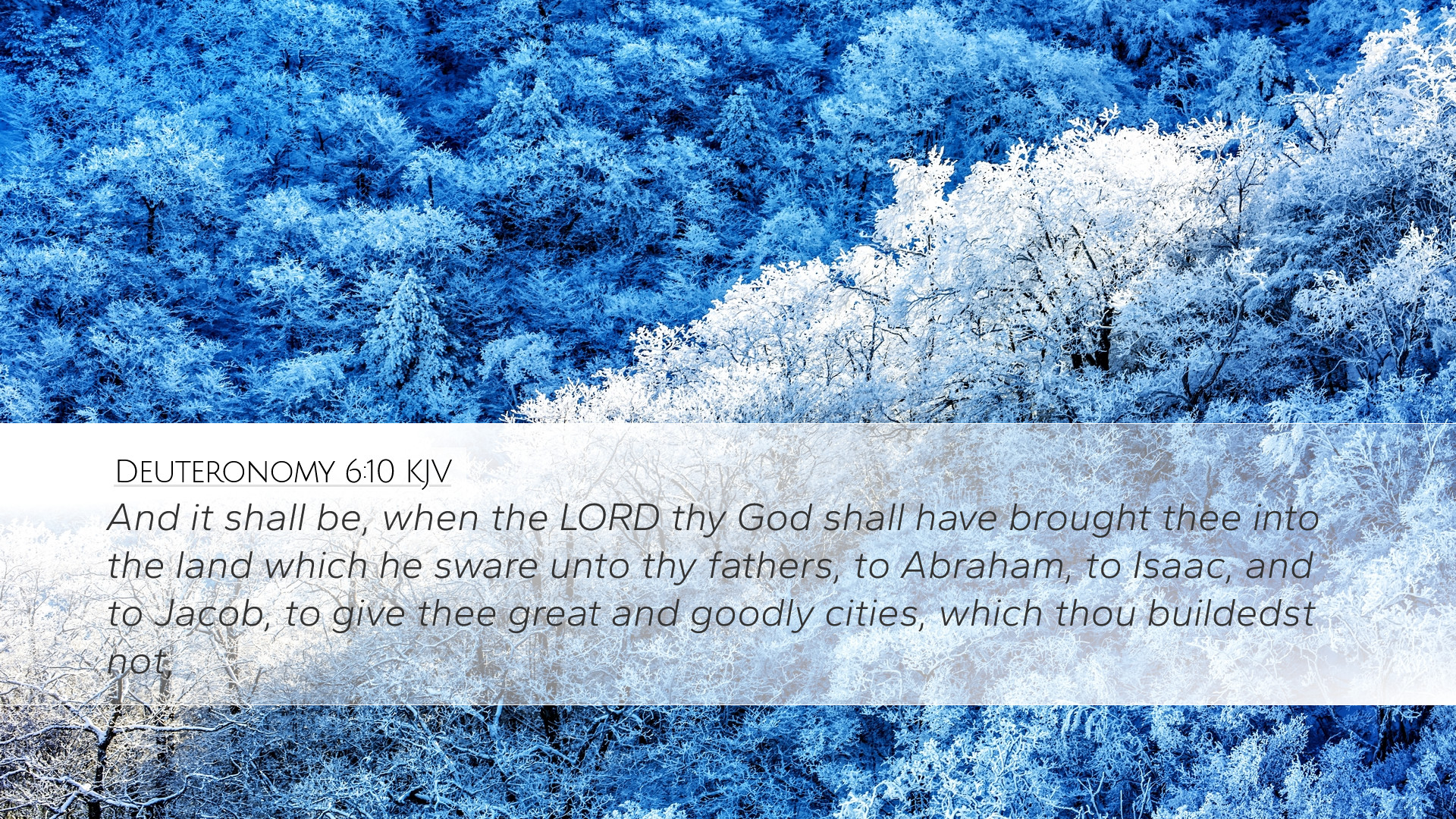Commentary on Deuteronomy 6:10
Verse Text: "And it shall be, when the Lord thy God shall have brought thee into the land which he sware unto thy fathers, to Abraham, to Isaac, and to Jacob, to give thee great and goodly cities, which thou buildest not."
Introduction
Deuteronomy 6:10 dwells upon God's promises of giving His people a land flowing with milk and honey—an indication of abundance, provision, and fulfillment of His covenant with the patriarchs. In this passage, one observes the theme of divine blessing contrasted with human effort, as the cities of Canaan signify both God's generosity and Israel's inheritance. The insights provided in this commentary aim to address the theological implications, societal relevance, and pastoral applications of this significant verse.
The Covenant Context
This verse exists within the framework of the covenant that God established with Abraham, Isaac, and Jacob. As highlighted by Matthew Henry, this is a critical reminder that God's promises are passed down through generations and emphasize the faithfulness of God to His covenant. The promise of land serves not only as a physical inheritance but as a spiritual inheritance, depicting the ultimate fulfillment found in Christ.
-
God's Faithfulness: The verse reinforces the idea that God remains true to His word throughout history. This serves as a theological cornerstone for understanding the narrative of Israel and the character of God towards His people.
-
Anticipation of Blessing: The phrasing "when the Lord thy God shall have brought thee" indicates the inevitable nature of God's promises coming to fruition. It signifies not just hope but assurance that God fulfills what He has vowed.
Divine Provision and Human Labor
The latter part of the verse highlights that the Israelites would dwell in cities not built by them. This assertion provides profound insight into the dynamics of divine provision as noted by Albert Barnes. The abundance and prosperity awaiting them are gifts from God, not the result of their toil. It is crucial to understand how dependence on God's blessings shapes our perception of work and success.
-
Dependence on God: This truth challenges the belief that achievements stem purely from human effort. Believers are reminded to recognize God as the ultimate source of all provision.
-
Gratitude in Abundance: In times of plenty, there lies a profound danger in forgetting the Giver, leading to complacency and pride. This verse serves as a reminder for individuals and congregations to maintain an attitude of thankfulness for God's grace in their lives.
Practical Implications for Believers
The realities expressed in Deuteronomy 6:10 have numerous implications for contemporary believers. As highlighted in Adam Clarke's commentary, this holds both individual and collective significance. Pastors, theologians, and students alike can draw from this rich source of application.
-
Fostering Generosity: Understanding that we benefit from God's generosity inspires believers to be generous in their own lives. Whether through financial support, time, or talent, recognizing our own blessings can lead to a culture of giving.
-
The Importance of Remembrance: Deuteronomy 6 emphasizes the vital attribute of remembrance within faith. It is crucial for individuals to reflect on God's past provisions during both abundance and scarcity, fortifying their faith.
-
Faithfulness in Service: The realization that our efforts are empowered by divine grace encourages believers to serve faithfully. Knowing that God will fulfill His promises encourages believers to work in trust, rather than anxiety.
Conclusion
Deuteronomy 6:10 stands as a testament to the nature of God's promises, emphasizing His faithfulness and generosity through tangible blessings. This engages a deeper understanding of the relationship between God and His people and encourages believers to respond with gratitude and faithful stewardship. In a world marked by uncertainty, this verse provides a solid foundation on which to build faith, character, and community.


